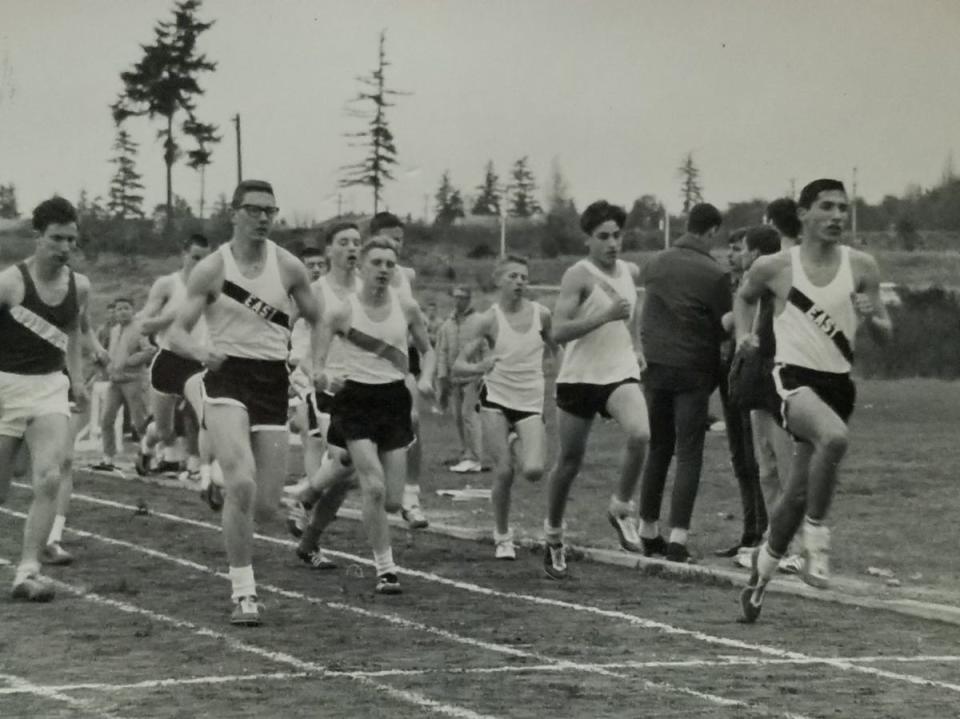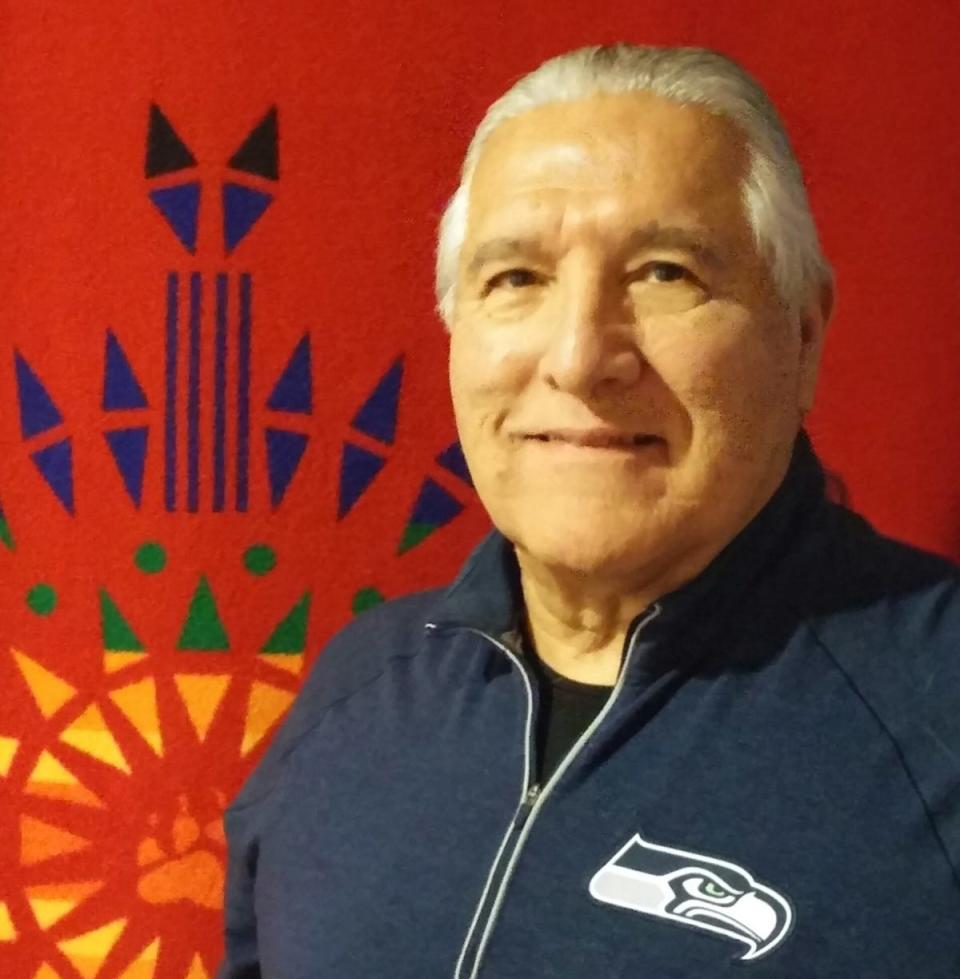Morrie Black-Eagle's athletic career a prelude to leadership positions his entire life

In 2007 Morrie Miller legally changed his name to Black-Eagle, the name his grandfather gave him in the traditional Native American custom. But it has not changed him for what he has always been, a loving human being who has made his community better.
Black-Eagle will be recognized for that Jan. 28 at Kiana Lodge when he is given the Rex Brown award and inducted into the Kitsap Sports Hall of Fame.
A 1967 graduate of East Bremerton High School, where he starred in football, track (he ran a 4:15 in the mile) and basketball, Black-Eagle went on to get two masters (counseling and computer science), work in major positions for corporations and finished his working career as deputy executive director for the Suquamish Tribe.
His community service work shouldn’t come as a surprise because his parents set the tone. Father Lee Miller was legendary for coaching and mentoring young kids for many years in the Kitsap community and mother — Lorene — worked as a state vocational rehabilitation counselor for those physically handicapped and mentally challenged.
“Our parents instilled in us to be respectful and to value other people and their opinions, even if you didn’t agree with them,” says Black-Eagle. “They said you also need to share yourself, your physical self with them at any time. If you have something they can use, you give it to them.”
Black-Eagle became a good running back from pee-wees to junior high and high school, and if not for a serious neck injury his senior year at East may have excelled in college.
“(Dad) was real serious about sports and it's one of the things that makes my induction into the Hall of Fame so special," Black-Eagle said. "In the early ‘40s he was a very good diver and swimmer and a fullback in football. He was one of the unique athletes of his time in high school (Rapid City, South Dakota) and could do a lot of different things. He was his school’s leading rusher, was a punter and receiver. He did it all, basically.”
Lee Miller, who obtained the nickname, “Chief,” in high school which he carried the rest of his life, was inducted into the Rapid City Hall of Fame for his sports endeavors.
Black-Eagle went to Washington State and pushed with a few others for the school to establish a Native American Studies program. There was some resistance by the administration, but the group prevailed and brother Bruce Miller became a recruiter for the program in his undergraduate days at WSU.
Black-Eagle started his working career in the Federal Way School District, then Highline School District and Bremerton School District, helping to establish Title IV Indian Education programs. He was an assistant freshman football coach and basketball coach at East Bremerton for two years.
“What I had grown to know and love about Morrie – we called each other brother – is he just plain loves people,” says Orv Olson, who was the East freshman football head coach. “When he was coaching those kids he coached them out of love and respect for them. The whole thing for him was getting them to learn and to grow.”

From 1979-80, Black-Eagle went back to school at the University of Arizona, got a degree in Management Information Systems and a second masters. He went to work for IBM as Systems Engineer for 10 years, four in Albuquerque and six in Seattle. For the next six years he was director of the Application Development Department for PEMCO insurance company in Seattle, worked two years as business systems development manager for Olympic Resource Management, spent three years as Information technology director for Kitsap County and then went to work in 2005 for the Suquamish Tribe, before retiring in 2019.
“He basically handled all the administration for the tribe and oversaw its finances,” says Suquamish chairman Leonard Forsman. “He is a great leader. He supervised all tribal members making sure services were provided.
“He was really good at organizing the government growth. We average about 400 employees and he helped us in a crucial time of growth and modernization. He helped tribal members get an education and opportunities for them. He inspired a lot of us. We used to reply on outsiders and he encouraged our members to do it ourselves.”
Black-Eagle designed and helped install the new technical infrastructure for all the new buildings the tribe built — fitness center, museum, sports and recreation building (brother Craig is the manager of sports and recreation) and the House of Awakened Culture (Community Center) and the remodel of administrative offices. He also assisted with the design of the technological infrastructure of the clubhouse at White Horse Golf Course.
Craig said of his brother’s work with the tribe, “They really looked up to what he had to say. He just has good leadership, all the way around. The thing that drives him is he wants to see people succeed. He’s the kind of guy who plays by the book. He will let you know when you get off track. He’s always been that way. I call him the All-American kid. I know he wasn’t a goody two shoes, but he never got in trouble that affected somebody else or hurt somebody. We were taught to respect people and how they wanted to be treated.”
An excellent fisherman, Black-Eagle once caught a 65-pound salmon on the Naknek River in Alaska. It took Black-Eagle an hour and 20 minutes to boat the big king. He also hauled in a in a 290-pound marlin in Costa Rica.
“It took me a couple hours to get him,” says Black-Eagle, who by nature is quite aware of the balance of life in our world. So he was determined to give the big marlin his due.
“We had a good battle,” Black-Eagle says. “I appreciated it, so I l let him go. I just felt he earned the right to go on and live his life.”
Black-Eagle calls trees "green leaf breathers," and cringes when he sees part of a great forest cut down to make room for housing units.
“We are not doing ourselves any favors for cutting down trees,” he says. “I almost look at the universe as a finite resource. The more damage we do by digging mother earth or cutting down trees or displacing animals, all the warming stuff we got going on will (double down on us).
“In my culture we believe we are connected to all things that are. When I mentioned the green breathers I was referring to the trees specifically, however the term applies to all vegetation as well.
”My people understood our relationship to green breathers and what the forests provided for us in the way of fostering environments for all kinds of animal life which in turn provided food for the people. Whenever my people cut down a green breather they thanked its spirit for the sacrifice it was making and for what it provides to the people.
“One day we will reach a point when the number of green breathing brothers is insufficient to absorb enough carbon dioxide to keep Mother Earth cool enough for future generations to survive and humans will experience catastrophic mass extinction.
“We must show more respect for our brothers the green breathers.”
Bottom line for Black-Eagle is that you make things better, whether they are people, animals, trees or the planet. We are all here to share and enjoy what there is, and out of respect you don’t harm anything.
“For sure,” says Craig. “Our parents installed in us to make it a better place.”
Black-Eagle echoed that sentiment.
“My parents taught me and my brothers and sisters to be courageous, respect others, humility, be generous and give to others and value your relationships. My mom always encouraged us to be our best and taught us to love unconditionally. She was my pillar of strength.”
There’s little doubt Black-Eagle has followed that lesson to a tee as he waits to be given the Rex Brown award at Hall of Fame ceremony.
“I had a good friendship with Rex as a referee, and umpire in slowpitch,” says Black-Eagle. “I got to know him over the years and he was a man of great professionalism and integrity. For me to be selected to receive this award named after him is a tremendous honor. I think I meet the standard for the man I have great respect for.”
Kitsap Sports Hall of Fame Ceremony
When: Jan. 28 (social hour at noon, induction ceremony at 1 p.m.)
Where: Kiana Lodge (14976 Sandy Hook Road NE, Poulsbo)
What: Annual banquet hosted by the Kitsap Athletic Roundtable honors athletes, coaches and officials from West Sound.
Tickets: $50 adults, $20 youth 6-12. Purchase by emailing requests to KAR treasurer Jodee Strickland at jodee.strickland@aol.com, or online at kitsapathleticroundtable.org.
This article originally appeared on Kitsap Sun: Kitsap Sports Hall of Fame to induct Morrie Black-Eagle

